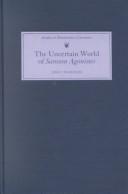| Listing 1 - 1 of 1 |
Sort by
|

ISBN: 1846153417 085991609X Year: 2001 Publisher: Cambridge ; Rochester, NY : D.S. Brewer,
Abstract | Keywords | Export | Availability | Bookmark
 Loading...
Loading...Choose an application
- Reference Manager
- EndNote
- RefWorks (Direct export to RefWorks)
Shawcross proposes that the many ambiguities surrounding Milton's dramatic poem Samson Agonistes are intentional: the actual words, the dates of composition, the genre, and the characters - particularly Samson and Dalila but including Manoa, Harapha, and the Chorus. Ambiguity also lies in Milton's presentation of political issues both philosophical and practical, his treatment of gender concepts, the constant questioning of the reader, and the poem's effect. Discussing all these elements, Shawcross follows with a detailed reading of the text which argues that it remains purposefully ambiguous, reflecting Milton's own recognition of the uncertainty of the content, and suggesting that Milton himself would question some of the nice 'solutions' that modern scholarship has offered in the last two decades. JOHN SHAWCROSS is Professor of English, Emeritus, University of Kentucky.
Belief and doubt in literature. --- Samson --- Milton, John, --- In literature. --- Samson, --- Shimshon --- Shimshoni, --- Shimshūn --- Simson --- שמשוני --- שמשון --- Enlightenment irreligion. --- Milton. --- Samson Agonistes. --- ambiguity. --- authorial intentions. --- dramatic poem. --- gender concepts. --- political issues. --- science. --- society. --- LITERARY CRITICISM / American / General.
| Listing 1 - 1 of 1 |
Sort by
|

 Search
Search Feedback
Feedback About UniCat
About UniCat  Help
Help News
News